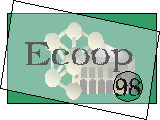
12th European Conference on Object-Oriented Programming
Brussels, Belgium, July 20 - 24, 1998

|
12th European Conference on Object-Oriented Programming |
Invited Talks |
Invited Talk I (Wednesday, July 22)
Mobile Objects and Mobile Agents: The Future of Distributed Computing?
Danny B. Lange
This talk will introduce you into the world of mobile objects and mobile agents, an emerging technology that makes it very much easier to design, implement, and maintain distributed systems. You will find that mobile agents reduce the network traffic, provide an effective means of overcoming network latency, and perhaps most importantly, through their ability to operate asynchronously and autonomously of the process that created them, helps you to construct more robust and fault-tolerant systems. I will also introduce you to software agents - the mobile as well as the stationary ones. I will explain all the benefits of mobile agents and demonstrate the impact they have on the design of distributed systems before concluding my talk with a brief overview of some contemporary mobile agent systems.
Danny B. Lange (http://www.acm.org/~danny) is director in the Agents Division at General Magic, Inc. located in Sunnyvale, California. Prior to joining General Magic, he was a visiting scientist at IBM Tokyo Research Laboratory, where he invented the Java Aglet and was the chief architect of IBM's Aglets Workbench. Most of this work is documented in his and Mitsuru Oshima's forthcoming book "Programming and Deploying Mobile Agents with Java Aglets" (Addison-Wesley June 1998). Danny received an MS and PhD in computer science from the Technical University of Denmark.
Malcolm Atkinson & Mick Jordan
Java has achieved rapid adoption as a object-oriented, portable programming language operational on a wide range of platforms. A prolific growth in interfaces (Java APIs) to persistence mechanisms and an abundance of commercial products are emerging as it as it becomes the preferred choice for new "enterprise" applications. These leave application programmers struggling with complex interactions and operational models, but provide essential access to legacy systems. It is possible to provide a framework for comparing this plethora of persistence mechanisms and to present some initial comparisons.
For twenty years, as proponents of orthogonal persistence, we have promised to relieve application programmers from the burden of the complexity that results from using different data models for long-term and short-term data. Java was a green-field site in which this promise might be delivered. After three years of attempting to deliver industrial strength orthogonal persistence for Java it is possible to identify both solid success and residual hurdles.
The talk will briefly review the Java phenomenon as it relates to persistence, with a quick classification of the alternative approaches to providing persistence for Java. It will then outline the way in which we provide orthogonal persistence. This emphasises the coherence of the model and the extension of safety to long-term data. The freely available operational prototype, PJama, will be described and demonstrated. It's current achievements and the approaches to remaining hurdles will be reviewed.
Malcolm Atkinson has led a campaign for orthogonal persistence to become part of application programmers' weaponary against complexity, since 1978. Twenty years on, he leads the PJama team at Glasgow, where he is a professor, in an alliance with Mick Jordan's team at SunLabs, California (where he is a visiting professor) in an attempt to build the world's first industrial strength orthogonally persistent programming language. He hopes to persuade industry and commerce to take advantage of its obvious benefits by the start of the next millenium.
Mick Jordan leads the Forest project at Sun Microsystems Laboratories, which is both working on the development of PJama and on the development of a set of software engineering tools to support distributed, collaborative software production. Prior to this he worked at Olivetti Research and DEC Systems Research Center on the Modula 3 project.